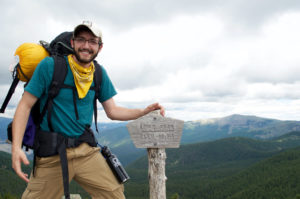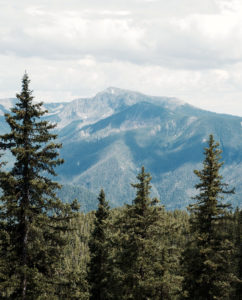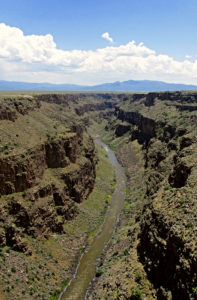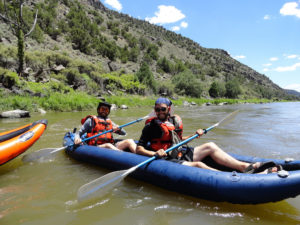
Tyler Eshelman is living in Taos, New Mexico and working as the program coordinator at the Taos Initiative for Life Together (TiLT). After studying Peacebuilding & Development at Eastern Mennonite University, Tyler moved to Taos to work with schools, churches and other organizations on sustainability projects and community building and education. TiLT is a Mennonite-based incubator for life-change focusing on sustainability, spiritual development and social justice.
Belden Lane, a prominent author of desert spirituality, says that when we come to the desert, the desert teaches us what we care about most and what we most need to let go of, letting the the pieces fall away into the emptiness and there, meeting God.
In June 2016 that is exactly what Todd Wynward called on a group of “committed fierce companions” to do. The invitation went out across the country to those who are made uneasy by, or as Martin Luther King Jr. says, “maladjusted” to the ways our modern society and culture cause harm to the Earth, to each other, to our ways of thinking and our spirituality. And fierce they were — seven individuals from various walks of life heeded the call and traveled to Taos, New Mexico.
This wilderness trek, a crucible in which we challenged ourselves to enter into the emptiness and the void of desert and solitude, compelled each of us to reflect on the ways in which we live in relationship with the world. This self-examination is far more than looking at how we as Christians and members of this global neighborhood impact each other, it is also about how our mentalities towards each other, ourselves, God and the Earth are re-shaped and re-invented through community, relationship and wilderness.
To be in the wilderness for even just one week is to experience new forms of interdependence, but also to feel your body in new ways — new challenges, new fatigue, new limits — and to overcome them.
A group learns that each member is important and the individual learns their importance and role in carrying the equipment, food and resources necessary for survival. It is a powerful thing to rely on each other to meet needs and to rely on our immediate surroundings for needs of water and shelter. Participant Jeff Boehr, age 60, from Bluffton, Ohio, said, “You are immersed in and confronted with the deep connection of your body, mind and spirit with the Earth. It is more than a living-on-the surface camp experience. The community experienced and potential spiritual depth available can be life-altering.”
Our trip started with backpacking in the Sangre de Cristo Mountains of northern New Mexico, our food and gear strapped to our backs. We had five days of rain, hail, sun, clouds and some of the most stunning mountainscapes and vistas; four nights of frigid temperatures, warm fires, hot meals, many laughs and stories, and of course, sleep. Each morning we checked our maps and headed out into the mountains forests — whether following a path or not — to make it to our next destination. Breaks were often times to partner up and share reflections on a particular guided conversation or question Todd challenged us with. This intimate interaction and relationship-building spurred us on into a deepening of our trek.
 It is impossible to talk about this trip without emphasizing just how important and impactful each member of our company was to one another’s experience. The depth, vulnerability, and determination each person carried themselves with allowed for an openness and care that created and held a safe, powerful and fun space for the week. Todd also planned time for quiet times of reading and writing as a part of processing our new context and new experiences.
It is impossible to talk about this trip without emphasizing just how important and impactful each member of our company was to one another’s experience. The depth, vulnerability, and determination each person carried themselves with allowed for an openness and care that created and held a safe, powerful and fun space for the week. Todd also planned time for quiet times of reading and writing as a part of processing our new context and new experiences.
One day consisted of hiking up Gold Hill (12,717 ft), a challenge-by-choice, nine-mile, side-hike, where we left our bags and enjoyed a different pace of exploring the New Mexican mountains. Feeling light and adventurous without our packs, our group fought through elevation and limited water to enjoy the most breathtaking sight of the trip. At the top we had the ability to see for miles and miles around in every direction, we experienced a mountain face covered in boulders and wildflowers, the wind whirling around us. In an uncolonized space like this, how can one not feel the presence of God?

After our five-day expedition, we made base camp in Lama, preparing for a few more days together. One of those days was a hike down into the Rio Grande Gorge, boats on our backs, paddles in hand. Kayaking down the gorge was equally as significant as being out in the mountains. To see the beauty of the river carving into the mesa and all its wildlife while learning about the pollution and degradation of the water, made the experience stick with us. To experience and understand both the power and vulnerability of our water is a critical part of understanding the environment and one’s sense of place.
Watershed Discipleship, is a way of place-based learning, lifestyle and growth. It is learning from our watershed — the water, the ground, the wildlife, the people — and understanding the rhythms and health of the natural landscape.
 The next part is living within your watershed and working towards healing the deep wounds and trauma caused by human carelessness or greed. The Rio Grande helped us to understand the significance of our lifeways and mentalities towards our systems. Many in our group came from places of abundant water, but being able to grasp water in a desert where water is a precious resource — a resource that has been grossly contaminated — helped to put many of our own patterns of consumption in perspective.
The next part is living within your watershed and working towards healing the deep wounds and trauma caused by human carelessness or greed. The Rio Grande helped us to understand the significance of our lifeways and mentalities towards our systems. Many in our group came from places of abundant water, but being able to grasp water in a desert where water is a precious resource — a resource that has been grossly contaminated — helped to put many of our own patterns of consumption in perspective.
Our final two days together involved a 24-hour solo experience, leaving from base camp to head back into the woods on our own. We had 24 hours to sit in silence, to read, to write, to think and to be commissioned to fashion a manifesto, a commitment to how we want to better be in the world. We were challenged to consider how we are becoming the people God has been waiting for.
How are we tuning into the hurt of the Earth and those in it, and responding? How are we accepting an invitation to be co-conspirators in God’s dream and love for the World?
Shalom, a Hebrew word, means the completeness of peace and restoration. If we are truly seeking right relationship with God, we must broaden our narrow understandings of who the completeness of peace and restoration is for. Both the Earth and our relationship to it are in desperate need of God’s Shalom. Our story and God’s are entwined in continued collaboration in working towards shalom, right relationship between us and all things. This is what the wilderness teaches us — the importance and incontrovertibility of these bonds and relationships.
We are extending to you — an invitation to join the mission, to join in the seeking of lifeways that bring healing and a God-inspired shalom.
The trip was long. The trip was fun. And we all learned more than we could have imagined. John Stoltzfus, age 44 from Lansdale, Pennsylvania, summed it up best, “The experience both exceeded my expectations, stretching me in both body and soul. I was both exhausted and filled by the end. This is not a ‘once-and-done’ kind of experience, but one that will continue to inspire new ways of living and being in relation to others, God, and the Earth.”

